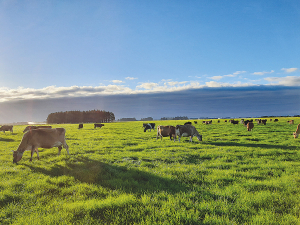Owen Jennings to represent NZ at Global Livestock Forum
Farming leader and former MP Owen Jennings will represent New Zealand at the II Congreso Mundial de Ganadería Sostenible (II World Congress on Sustainable Livestock) in Spain next month.
 The Methane Science Accord is welcoming a recent move by Government to seek outside advice on reducing biological methane targets.
The Methane Science Accord is welcoming a recent move by Government to seek outside advice on reducing biological methane targets.
The lobby group the Methane Science Accord (MSA) says it welcomes a recent government move to seek outside advice on reducing biological methane targets, rather than relying on recommendations made by the Climate Change Commission.
MSA says it will be "very actively involved in this initiative". The group says it has outlined its position on the topic and what it will use to lobby government, argue before the Primary Industry Select Committee and in the media - "the few that publish our findings."
In a recent newsletter to supporters, the group outlined its five-point summary of its position on methane targets, claiming that ruminant methane is too miniscule and insignificant to tax or curtail.
It also argues that Article 2 (b) of the 2015 Paris Agreement requires countries to avoid measures that "threaten" food production.
"New Zealand has the lowest so-called footprint of any food producing nation by a margin of 40% indicating 'leakage' would occur if New Zealand's food production were reduced.
"The MSA also asserts there is no need for any action against ruminant methane and points out to those who demand taxing, that thee measures relocate a source of emissions from one country to another."
MSA is also calling on the Government to join with Federated Farmers and industry bodies to urgently build an international constituency to counter any moves to tax or curtail ruminant methane.
"Such a constituency would be with countries where ruminant methane emissions are high and developing countries who are building an agricultural industry based on ruminants.
"In New Zealand, ruminant methane emissions peaked in 2005 and have fallen slightly since, according to the Ministry for the Environment.
"The relative insignificance of ruminant methane emissions means any proposals to tax or curtail them must be a political action - not a science-based decision."
MSA argues that there is no basis for taking restrictive action against ruminant methane and curtailing production in one country and having that production occur in another country with a much higher carbon footprint.
"An abiding concern of all climate policy is to avoid measures that relocate a source of emissions from one country to another but do nothing to reduce total emissions. This is called carbon leakage."
It adds that around 95% of the milk produced in New Zealand is processed for export. "The global volume of those markets is determined by aggregate demand, and any reductions by one supplier will be quickly replaced by another supplier."
The group maintains that 'leakage' of NZ's dairy production would not only be bad for New Zealand but also a disaster for the Paris Agreement.
"That is because New Zealand's farm production has the lowest carbon footprint in the world - less than half the international average. If a tonne of butter processed here was produced in Germany instead, the associated methane emissions would double."
MSA also takes issue with claims made by some exporters and commentators who say there will be market retaliation if NZ doesn't act on methane.
"Who could possibly justify taking action against New Zealand farmers who have the lowest carbon footprint by a huge 40% margin of any food producing nation?"
Who?
The Methane Science Accord is an agreement between Groundswell, F.A.R.N., 50 Shades of Green and the Rural Advocacy Network. It claims to have a membership of more than 100,000 farmers and supporters.
Agricultural and veterinary product supplier Shoof International has appointed Michaela Dumper as its new chief executive.
Federated Farmers is celebrating following the Government's announcement that young farmers will be able to use their KiwiSaver funds to buy their first home or farm.
The Meat Industry Association of New Zealand (MIA) today announced that Chief Executive Officer Sirma Karapeeva has resigned from the role.
The winners of the 2026 Hawke’s Bay/Wairarapa Dairy Industry Awards were announced at the annual awards dinner held at Copthorne Solway Park in Masterton on Thursday evening.
Environment Southland is welcoming this week’s decision by the Environmental Protection Authority (EPA) to approve the release of Blaptea elguetai, a leaf‑feeding beetle that will help control the highly invasive Chilean flame creeper.
This March, the potato industry is proudly celebrating International Women’s Day on 8 March alongside the International Year of the Woman Farmer, recognising the vital role women play across every part of the sector — from paddocks and packhouses to research, leadership, and innovation.

OPINION: A mate of yours truly reckons rural Manawatu families are the latest to suffer under what he calls the…
OPINION: If old Winston Peters thinks building trade relations with new nations, such as India, isn't a necessary investment in…